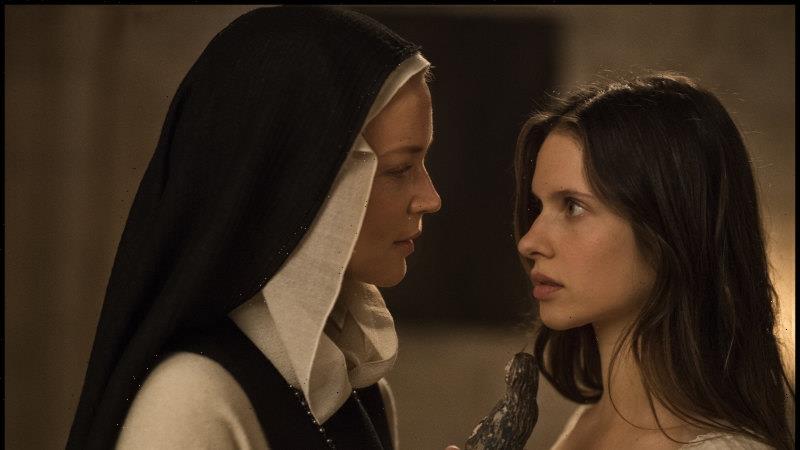Benedetta
Directed by Paul Verhoeven
131 minutes, rated R 18+
★★★★
The prospect of a Paul Verhoeven film about a famous lesbian nun from the late 16th century makes one tremble: could it be as bad as Showgirls, his expose of the travails of Las Vegas strippers, or as good as The Fourth Man, the thriller he made before leaving Holland for Hollywood in 1983?
Like Scorsese, he is obsessed with God and violence, spirituality and sexuality, shock and the sublime, but Verhoeven has always seemed like the naughty older brother – less art, more titillation. He emerged in Dutch film like a comet at the end of the 1960s. Nudity and sex were revolutionary tools for a boy who could remember dead bodies in the street in 1945. His films broke all records.
Virginie Efira (right) as Benedetta and Daphne Patakia as her young lover, Bartolomea.
In America, he parked his artistic ambitions in favour of making hits, at which he was exceptional: Robocop, Total Recall, Basic Instinct, Starship Troopers. Recently, he returned to The Netherlands for more thoughtful material like Elle, from 2016. Benedetta, though rich in outrage, is more like that film: pyschologically gripping, thematically rich, open to wide interpretation.
Don’t misunderstand: a pious viewer will turn blue at some of the things depicted here. They might turn puce to read the original sources, which fed into Judith C Brown’s non-fiction book Immodest Acts, The Life of a Lesbian Nun in Renaissance Italy, the film’s main source.
When Benedetta Carlini (the Belgian actress Virginie Efira) reaches her full flowering as a mad mystic in the town of Pescia, in the early 17th century, things get very weird indeed. Pledged to a convent at 10, she already has delusions of power, with a direct line to the Virgin. Her rich father pays her dowry to the abbess (Charlotte Rampling), because “charity has no place in a convent”. Benedetta quickly grows in ambition, her visions convincing the other sisters that she and God are in constant dialogue. The trouble starts when an abused young woman arrives. Bartolomea (Daphne Patakia) is sexually bold and attracted to the saintly Benedetta. Pretty soon they’re making the beast of two backs, as the abbess watches through a spy hole.
Screenwriter Gerard Soeteman, longtime collaborator with Verhoeven, walked away from this one because he thought it was too focused on sexuality. I can see what he means but what’s striking is the film’s serious desire to imagine what might have been going on in Benedetta’s head, not just her loins. That’s where the film derives its power, as a human document.
That has long been Verhoeven’s pet subject. He was a member of the Jesus Seminar, a controversial attempt by Biblical scholars and laymen to reinterpret Jesus the historical man, rather than Jesus the son of God. Benedetta is Verhoeven’s sincere, sometimes profoundly moving, attempt to do the same thing with a woman who has become an infamous historical figure. Verhoeven can’t stay away from the sins of the flesh, of course. That’s part of his argument: if you remove a sense of shame, what’s left but love and beauty? Cue the outrage.
A cultural guide to going out and loving your city. Sign up to our Culture Fix newsletter here.
Most Viewed in Culture
Source: Read Full Article






